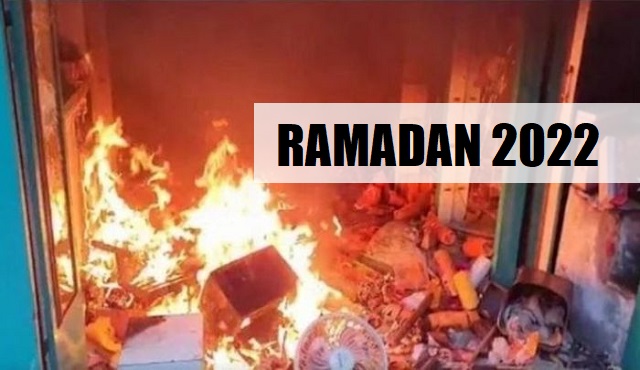RAMADAN 2022: The Holy Month and the Pursuit of Jihad

The world can now breathe a sigh of relief that the holy month of Ramadan is finally over. In recent years, the world has witnessed a surge in the intensity and frequency of Islamic jihad violence during this “holy month.” The pattern was no different this year; if anything, there have been more instances of recorded Islamic violence than the previous years.
Ramadan started on April 2 this year, coinciding with the first day of the Hindu New Year, celebrated in India. In the Indian state of Rajasthan, Muslim crowds unleashed a planned attack on the Hindus’ procession. The procession was attacked by bikers when it passed through a “Muslim area” in Karauli. The Muslims had placed stones, brickbats, and petrol bombs on their rooftops, and began throwing them at the Hindus at first sight of their procession. What started with a hail of stones culminated in arson attacks, as well as the vandalizing of Hindu ships, and the burning of bicycles.
On April 3, Ahmed Murtaza, a chemical engineer, tried to enter a Hindu temple in Gorakhnath; he screamed “Allahu akbar” while wielding a machete. Though the police arrested him before he could cause any significant harm, he succeeded in injuring two cops in the brawl. Investigations revealed that Abbasi was a terrorist-in-the-making; he was committed to the ideology of the Islamic State and had used various social media platforms to establish contacts with ISIS terrorists.
After this rocking – quite literally – start to the “holy month of peace,” Muslim forces in all corners of the globe took to innovative ways of continuing their legacy of violence.
On April 7, Raad Hazem, a 28-year-old Palestinian gunman, opened fire in a crowded bar in Tel Aviv, Israel, killing three and wounding ten more. The police gunned him down near a mosque on Jaffa the next day.
Synchronized mobs of Muslims attacked Hindus in seven Indian states on the occasion of the Hindu Ram Navami festival on April 10. The modus operandi of these attacks was similar to the onslaught of April 2.
The following day, Muslim youths in Spain tried to block an Easter procession, as they believed that the Holy Week procession was wrong and offensive. Some in the Muslim community seem to harbor a detestation for processions of non-Muslims anywhere, be it the Hindus in India or Christians in Spain.
Another shared virtue of some Muslims worldwide is their penchant for collecting stones and hurling them at the “kaffirs.” Taking a cue from their coreligionists in India, Palestinians sheltered in the Al-Aqsa mosque in East Jerusalem began throwing stones at Israeli forces on Friday, April 15. There was no respite for the Israeli police during this time. They had to go into action against Muslims again in less than 48 hours when Palestinians started throwing stones to block Jewish visitors from the Temple Mount on April 17.
The stone-throwing in Israel took place just a day after Muslim mobs in Delhi, India, attacked Hindus again in the familiar and tested fashion when the Hindus began a procession for Hanuman Janmostav. Interestingly, reports suggest that the Muslims who attacked the Hindus in the nation’s capital were illegal Bangladeshi immigrants who entered India over the porous Indo-Bangladesh border. Right about this time, Muslims in Sweden decided to go on a rampage after hearing that so-called far-right activists were planning to burn copies of the Quran. This led to violent clashes between the Police and the mob.
It’s not just the kaffirs that have to bear the brunt of Islamic jihad. This ideology is plagued with sectarianism; Muslims don’t go easy on the “other” kind of Muslims, either. Infighting is common among the different schools of Islam. On April 5, Abdullatif Moradi, a 21-year-old Muslim youth from Uzbekistan who illegally entered Iran in 2021 from the Pakistan border, reached the Imam Reza shrine in Mashhad, Iran, and stabbed two Shia clerics to death. His plan was to take down three, but he could only manage to injure the third one severely before being arrested along with his six other accomplices. He was identified as a “takfiri,” a Muslim who believed other Muslims were not truly Muslim, and who believed that Shia Muslims were heretics whose blood should be spilled.
The blasts that rocked the Abdul Rahim Shahid High School area on the 19th, in a Shia-dominated part of Kabul, Afghanistan, were another instance of Muslim-on-Muslim violence. Afghanistan kept trembling under the absolute rule of Sharia as one bomb after another exploded through the remaining days of Ramadan. Deafening explosions ripped through the Kunduz mosque, killing over 39 and injuring 43 Muslims who had gathered to offer Friday prayers on April 22.
Things weren’t peaceful in the neighboring country either. On April 26, a 31-year-old Muslim Balochi woman, a mother of 2, blew herself up in Karachi, Pakistani, to support the Balochi freedom movement. Three Chinese nationals became victims in the ongoing conflict between Pakistan and the Balochis. The suicide bomber, a primary school teacher by profession, was convinced that disappearing in a ball of fire was more important than educating children in a crisis-stricken country.
These incidents, steeped in the blood of the innocent people, corroborate the fact that regardless of geography, languages spoken, education, and profession, the philosophy of the jihadi mind remains constant and adamant in its pursuit of the blessings of Allah.
AUTHOR
RELATED ARITICLES:
Amazon removes The Critical Qur’an from its ‘Qur’an’ bestseller list
Canada: Islamophobic hate crime at mosque turns out to have committed by Muslims
EDITORS NOTE: This Jihad Watch column is republished with permission. ©All rights reserved.
